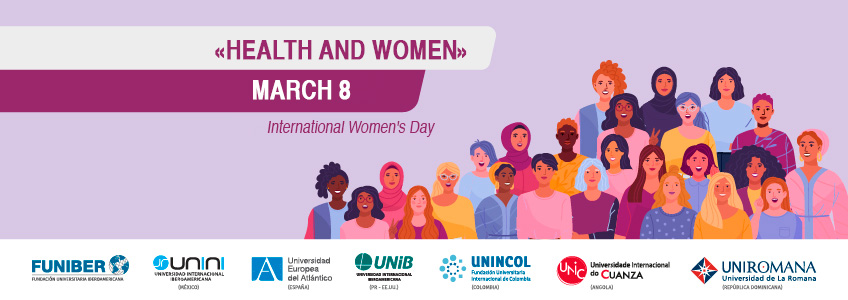From the Social Action area of the Iberoamerican University Foundation (FUNIBER), a series of activities have been organized to celebrate International Women’s Day, commemorated today, March 8.
The activities are part of the “Health and Women” special, which aims to highlight important aspects of healthcare from a gender perspective.
Mental Health
At FUNIBER, we have interviewed psychologist Cristina Ceballos, academic coordinator of the Psychology area, who addresses, from a social perspective, some issues relevant to women’s mental health. The interview inaugurates the “Wellness” program, created by the Social Action area as a space for the dissemination of knowledge and practices for personal and social development, through a positive and healthy approach that seeks to contribute to the continuous improvement of the quality of life.
Health and Nutrition
At the Universidad Europea del Atlántico (European University of the Atlantic, UNEATLANTICO), Professor and Dr. Sandra Sumalla, dean of the Faculty of Health Sciences, who addressed some key aspects of the relationship between nutrition and women’s health, such as the benefits of a healthy diet, the problem of misinformation about diets in social networks, and the importance of implementing specific educational programs for university women.
Intimate health
In Angola, there are activities throughout the month organized by the Extension area of the Universidade Internacional do Cuanza (International University of Cuanza, UNIC) and its Student Association. With the title of “Março Mulher Saudável: Empoderando a todas, construindo igualdade” (March Healthy Women: Empowering All, Building Equity), the actions include the production of the Intimate Health Manual, developed jointly with FUNIBER and the Universidad Europea del Atlántico (UNEATLANTICO), through the Erasmus Plus CLINICALSIM project. In addition to the Manual, which is also available online, round table discussions and lectures will be organized with specialists and nursing professors, as well as a campaign to donate intimate absorbent pads for women with limited economic resources in the community of Bié, Cuito.
Physical Activity and Health
At the Fundación Universitaria Iberoamericana de Colombia (Iberoamerican University Foundation of Colombia, UNINCOL), the University Welfare area celebrates the date by organizing the online discussion “Physical Activity and Women’s Health,” with the lecture of Professor Amelia Stern, at 13:00 (Colombia time), with live broadcast via Youtube or Facebook Live.
“Physical activity and sport have become an aspect of great relevance within a healthy lifestyle, reflected in the improvement of quality of life both physically and mentally, as well as the perception of health and well-being at a social level. In the female field, we can optimize all the benefits of exercise by considering the physiology of women. For this, it is important to know about the most relevant physiological and anatomical characteristics of women, as well as their particularities in the practice of sports throughout each of the vital stages,” explains Professor and Dr. Amélia Stern.
Health Research
The MLS Journals publishing house, promoted by FUNIBER, joins the initiative, highlighting 10 articles published in its different scientific journals, which seek to better understand aspects related to women’s health. Research is essential to improve knowledge about women’s specific needs, and although for many years it has been a topic that has received little attention, it is becoming increasingly relevant.
The MLS Communication Journal editor-in-chief, Dr. Mónica Bonilla del Río, highlights: “Research on issues linked to women’s health is critical to ensuring a more equitable and healthy future for all. These studies need to be prioritized and supported to address the specific needs and improve the quality of life of women worldwide,” she says.
María Jesús Colmenero Ruiz, editor-in-chief of the MLS Inclusion and Society Journal, also highlights more research on the health of women with disabilities. “Research on the health of women with disabilities is gaining increasing attention and recognition in academia and science. In-depth studies are underway to better understand the specific needs of this demographic group. However, important gaps in our understanding remain,” she says.
